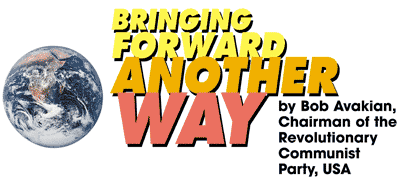Revolution #87, May 6, 2007

Part 4
Editors' Note: The following are excerpts from an edited version of a talk by Bob Avakian, Chairman of the Revolutionary Communist Party, USA, to a group of Party supporters, in the fall of last year (2006). This is the fourth in a series of excerpts we will be running in Revolution. Subheads and footnotes have been added for publication here. The entire talk is available online at revcom.us/avakian/anotherway.
Here I want to bring up a formulation that I love, because it captures so much that is essential. Soon after September 11 someone said, or wrote somewhere, that living in the U.S. is a little bit like living in the house of Tony Soprano. You know, or you have a sense, that all the goodies that you've gotten have something to do with what the master of the house is doing out there in the world. Yet you don't want to look too deeply or too far at what that might be, because it might upset everything—not only what you have, all your possessions, but all the assumptions on which you base your life.
This is really capturing something very powerful, not only in a general sense but also more specifically in terms of what is pulling on a lot of people who should be in motion very vigorously and with real determination against the outrages that are being perpetrated in their name and by their government—by this ruling class, and by the core that's at the center of power now in the U.S.
When this analogy, or metaphor, of "living in the house of Tony Soprano" was first brought forward (or when I first heard of it, at least), in the immediate aftermath of September 11, 2001, it was very timely and relevant. But September 11th was a rude announcement that there's a price to be paid for living in Tony Soprano's house, for continuing to go along with these profoundly unequal relations in the world and the way that your government, and this system fundamentally, bludgeons people in the world into conditions of almost unspeakable suffering in order to keep this whole thing going and in order, yes, for some "goodies" to be handed out to sections of the population in the "house"—not only "goodies" in an economic sense but also in the form of a certain amount of stability, and a certain functioning of democracy (bourgeois democracy) within the U.S. itself. All that is being shaken up now. Now, you don't just get the goodies for "living in Tony Soprano's house"—you get the "strangers" out in the backyard at night. "They're out there somewhere." It's a different world. It isn't the same equation as it was, even a decade or so ago—it's not the same now "living in Tony Soprano's house."
It is not that everything was all smooth and nice for everybody in this house—for many people in the U.S. that has been far from the case—and it is not that nobody was aware of things going on in the world, of what "Tony Soprano" was doing to people out there all over the world. In fact, one of the ironies is that a lot of people have been somewhat aware of this, but when the terms get sharpened up, some people want to pull back from what they themselves know. And so we have to get into real and sometimes sharp struggle with people.
This is a point I believe I made in one of those recent 7 Talks1—and, in any case, it is a very important point to emphasize: There is a place where epistemology and morality meet.
There is a place where you have to stand and say: It is not acceptable to refuse to look at something—or to refuse to believe something—because it makes you uncomfortable.
And: It is not acceptable to believe something just because it makes you feel comfortable.
Ultimately, especially in today's world, to do that is a form of complicity, and we should struggle with people about that.
And it also won't work to apply that kind of approach. You'll just end up in a very bad place, reinforcing both of the "historically outmodeds" and being on the wrong side of what needs to happen in the world, if you follow that approach out to its logical conclusion.
We need a different world than one where there are a few houses of Tony Soprano, surrounded by a seemingly endless sea of suffering and oppressed humanity, living in terrible squalor and under undisguised tyranny; where the power, wealth and privilege of the relative few depends on, and is grounded in, the exploitation and misery of the many (and where, even within "Tony Soprano's house" itself, there are many who are treated as little better than second-class members of the family, or as despised servants). This is a world that cannot, and should not, go on as it is.
Even before people are won to the communist standpoint and program, to fully deal with this, there is a struggle to be waged and they can be won to the broad position that we need a different world. We can struggle about what that world should be, and how it should be brought into being; but this dynamic we're on is going to lead to a disaster for humanity, including all of those who are trying to hide from it, in one form or another, or are thinking that if they remain passive, somehow it will pass them by.
1. The audio files of the 7 Talks, along with the Q&A and Concluding Remarks for those talks, are available for listening and downloading at bobavakian.net and recom.us [back].
